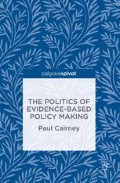Abstract
The term ‘evidence-based policymaking’ (EBPM) is in common currency in traditional mass media and social media. Yet, it is a vague, aspirational term, rather than a good description of the policy process. This chapter injects some clarity into the debate by examining how to define EBPM in a more useful way, demonstrating the importance of the policy process to the role of evidence, and identifying the crucial role of policy theory to our understanding of that process.
Access this chapter
Tax calculation will be finalised at checkout
Purchases are for personal use only
References
Bastow, S., Dunleavy, P., & Tinkler, J. (2014a). Measuring the impact of social science research in UK central government policy making. Political Studies Association Annual Conference, Manchester. http://bit.ly/1iSMw4P
Bastow, S., Dunleavy, P., & Tinkler, J. (2014b). The impact of the social sciences. London: Sage.
Baumgartner, F., & Jones, B. (1993; 2009). Agendas and instability in American politics (1st and 2nd eds.). Chicago: Chicago University Press.
Bédard, P., & Ouimet, M. (2012). Cognizance and consultation of randomized controlled trials among ministerial policy analysts. Review of Policy Research, 29 (5), 625–644.
Béland, D. (2005). Ideas and social policy: An institutionalist perspective. Social Policy & Administration, 39 (1), 1–18.
Berry, F., & Berry, W. (2014). Innovation and diffusion models in policy research. In P. Sabatier & C. Weible (Eds.), Theories of the policy process (3rd ed.). Chicago: Westview Press.
Birkland, T. (1997). After disaster: Agenda setting, public policy, and focusing events. Washington, DC: Georgetown University Press.
Cairney, P. (2012a). Understanding public policy. Basingstoke: Palgrave.
Cairney, P. (2012b). Complexity theory in political science and public policy. Political Studies Review, 10 (3), 346–358.
Cairney, P. (2013). Standing on the shoulders of giants: How do we combine the insights of multiple theories in public policy studies? Policy Studies Journal, 41 (1), 1–21.
Cairney, P., & Heikkila, T. (2014). A comparison of theories of the policy process. In P. Sabatier & C. Weible (Eds.), Theories of the policy process (3rd ed.). Chicago: Westview Press.
Cairney, P., & Studlar, D. (2014). Public health policy in the United Kingdom: After the war on Tobacco, is a war on alcohol brewing? World Medical and Health Policy, 6 (3), 308–323.
Cairney, P., Studlar, D., & Mamudu, H. (2012). Global tobacco control: Power, policy, governance and transfer. Basingstoke: Palgrave.
Embrett, M., & Randall, G. (2014). Social determinants of health and health equity policy research: Exploring the use, misuse, and nonuse of policy analysis theory. Social Science and Medicine, 108, 147–155.
Jenkins-Smith, H., Nohrstedt, D., & Weible, C. (2014). The advocacy coalition framework: Foundations, evolution, and ongoing research’ process. In P. Sabatier & C. Weible (Eds.), Theories of the policy process (3rd ed.). Chicago: Westview Press.
John, P. (2012). Analysing public policy (2nd ed.). London: Routledge.
Kingdon, J. (1984; 1995). Agendas, alternatives and public policies (1st & 2nd eds.). New York: Harper Collins.
Kok, M., Rodrigues, A., Paulo Silva, A., & de Haan, S. (2012). The emergence and current performance of a health research system: Lessons from Guinea Bissau. Health Research Policy and Systems, 10 (5), 1–12. http://www.health-policy-systems.com/content/10/1/5.
Lavis, J. N., Lomas, J., Hamid, M., & Sewankambo, N. K. (2006). Assessing country-level efforts to link research to action. Bulletin of the World Health Organization, 84 (8), 620–628.
Lindblom, C. (1964). Contexts for change and strategy: A reply. Public Administration Review, 24 (3), 157–158.
Majone, G. (1989). Evidence, argument and persuasion in the policy process. New Haven: Yale University Press.
Marston, G., & Watts, R. (2003). Tampering with the evidence: A critical appraisal of evidence-based policy-making. The Drawing Board: An Australian Review of Public Affairs, 3 (3), 143–163.
Monaghan, M. (2011). Evidence versus politics: Exploiting research in UK drug policy making? Bristol: The Policy Press.
Nilsen, P., Ståhl, C., Roback, K., & Cairney, P. (2013). Never the twain shall meet? A comparison of implementation science and policy implementation research. Implementation Science, 8 (1), 63.
Nutley, S., Powell, A., & Davies, H. (2013). What counts as good evidence. London: Alliance for Useful Evidence. http://www.alliance4usefulevidence.org/assets/What-Counts-as-Good-Evidence-WEB.pdf.
Oliver, K., Innvar, S., Lorenc, T., Woodman, J., & Thomas, J. (2014). A systematic review of barriers to and facilitators of the use of evidence by policymakers. BMC Health Services Research, 14 (1), 2. http://www.biomedcentral.com/1472-6963/14/2.
Oliver, K., Lorenc, T., & Innvær, S. (2014). New directions in evidence-based policy research: A critical analysis of the literature. Health Research Policy and Systems, 12, 34. http://www.biomedcentral.com/content/pdf/1478-4505-12-34.pdf.
Sabatier, P., & Jenkins-Smith, H. (Eds.). (1993). Policy change and learning: An advocacy coalition approach. Boulder: Westview Press.
Sabatier, P., & Weible, C. (Eds.). (2014). Theories of the policy process (3rd ed.). Chicago: Westview Press.
Sanderson, I. (2009). Intelligent policy making for a complex world: Pragmatism, evidence and learning. Political Studies, 57, 699–719.
Weiss, C. (1979). The many meanings of research utilization. Public Administration Review, 39 (5), 426–431.
Zahariadis, N. (2007). The multiple streams framework. In P. Sabatier (Ed.), Theories of the policy process. Cambridge, MA: Westview.
Author information
Authors and Affiliations
Copyright information
© 2016 The Editor(s) (if applicable) and The Author(s)
About this chapter
Cite this chapter
Cairney, P. (2016). The Science of Policymaking. In: The Politics of Evidence-Based Policy Making. Palgrave Pivot, London. https://doi.org/10.1057/978-1-137-51781-4_1
Download citation
DOI: https://doi.org/10.1057/978-1-137-51781-4_1
Published:
Publisher Name: Palgrave Pivot, London
Print ISBN: 978-1-137-51780-7
Online ISBN: 978-1-137-51781-4
eBook Packages: Political Science and International StudiesPolitical Science and International Studies (R0)

